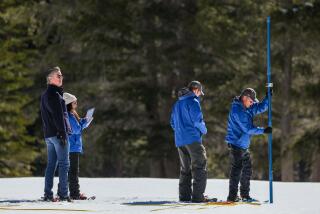Snowstorm and climate change
Reporting from Washington — As record snowfall buried the nation’s capital this week, the quickest joke around town was, “So much for global warming.”
The quip was timely, given the recent controversies over Climategate -- the release of e-mails allegedly showing some leading climate scientists trying to suppress criticism -- and new questions about the integrity of the United Nations’ Intergovernmental Panel on Climate Change.
After 55-plus inches of snow fell in the Washington area, critics are delighting in the irony, and those who warn of climate change are taking pains to say the snow fits the pattern of a warming world.
So who’s right? If the earth is warming, why all the snow?
Snow and global warming aren’t mutually exclusive, climate scientists say. For starters, the amount of recorded warming over the last century, about 1 degree Fahrenheit above preindustrial levels, is nowhere near enough to eradicate winter in the mid-Atlantic.
Also, weather is variable: The planet would have extreme highs and lows with or without an overall warming trend.
And for all the recent snow in Washington, it hasn’t been that cold -- mostly in the 20s or low 30s. The average temperature in Washington in January, according to the National Climatic Data Center, was about a degree warmer than the average for the last 40 years.
But the reverse is also true: The fact that Vancouver, Canada, is experiencing record-high temperatures and importing snow for the Winter Olympics doesn’t prove a warming trend.
Are the snowstorm and climate science completely unrelated, then?
Not necessarily. Increased snowfall fits a pattern suggested by many climate models, in which rising temperatures warm the world’s bodies of water, leading to more evaporation.
Climate scientists say the amount of atmospheric moisture has increased, which they predict will bring more rain in warmer conditions and more snow in freezing temperatures.
“All you need is cold air and moisture to meet each other” to make snow, said Jay Gulledge, senior scientist for the Pew Center on Global Climate Change. “And with global warming, the opportunities to do that should be more frequent.”
How will the snow affect the politics of the climate bill?
Probably not much, because proponents are pitching the bill as a boost to national security and a creator of clean-energy jobs, as opposed to a curb on global warming. The swing voters who will dictate the bill’s fate are senators who more or less say they accept the science behind climate change.
On the other hand, the snow has given some novel arguments to opponents of the “cap and trade” system of limiting emissions, which is the heart of most climate proposals. Critics warn that such a system, in which emitters must obtain permits to cover the carbon dioxide and other greenhouse gases they release, would send electricity prices soaring -- particularly during extreme weather events.
William O’Keefe, a cap-and-trade critic and chief executive of the nonprofit George C. Marshall Institute, observed: “As Washington works to clear its streets from this week’s ‘snowpocalypse,’ policymakers should work to clear a new path on climate policy.”






